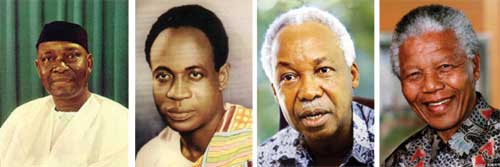One could mistake the flyers and invitation cards distributed by organisers of the discourse on leadership values in Nigeria and Africa for one of those events arranged in Lagos to get idle residents to sit down and listen to homilies.

But the summit convened by the African Presidential Papers and Libraries Project (APPLP) was more than that. It drew university students, lecturers, professionals, rights activists, and leadership mentors.
It was planned to coincide with the birthday of Nigeria’s first President, Nnamdi Azikiwe, and the current mood of a nation which unity is threatened by Boko Haram terrorists in the North East.
Minds were concentrated on the question: “Why has the once celebrated unity of Nigeria, which formed its major source of weapon against colonial rule and enabled it to chase away colonial intruders without firing a bullet come to this tragic state?”
Speakers dwelled on the sub theme “Where do we go from here?” and tried to answer the myriad of questions on why Nigeria deteriorated into an embarrassing leadership flux.
High caliber attendance
Those who attended the summit included a Zikist and former Anambra State Governor, Chukwuemeka Ezeife; APPLP Co-ordinator (Nigeria), Funmi Banmeke; Segun Kolawole, both of the department of sociology, University of Lagos (UNILAG); Uche Nwankwo, author of Zik, Ndigbo and Their Southern Neighbours.
They also included The Remnant Fellowship founder, Njideka Anyadike; human rights lawyer, Festus Keyamo; and Jacob Gordon, professor emeritus, APPLP initiator and Chairman of the Kwame Nkrumah Institute of African Studies, University of Ghana, Accra.
X-raying Zik’s values
Ezeife opened the discourse by locating Africa’s leadership dilemma on the inability of the black man to believe that he can organise his life to attain his destiny because of his inferiority complex.
He argued that “the first human being God created was a black man. But man fell from grace to grass and from there assumed he is inferior. Nnamdi Azikiwe was created in the image of God, just as God said He created man in His own image.
“God destined that from Africa will emerge an economic power that will dominate the African continent. And if we co-operate as one, we can achieve that purpose. Zik achieved his destined purpose in life, of allowing himself to be used by God to liberate the black man from mental enslavement.
“That was why he was able to save Nigeria from total disintegration during the war. He had superior counsel. He could not allow a house he built to be destroyed. And reflectively, it is clear that he has been vindicated.
“Nigeria can still attain her destiny as the leading nation in the black world remaining united than disintegrating.”
Nwankwo identified Zik’s three major contributions to Nigerian politics.
“The first thing to note about Nnamdi Azikiwe is that he came into Nigerian politics with a triple mandate: (1) to help free the country from colonial subjugation, (2) to work for inter-ethnic harmony, a better life and national integration of the diverse peoples of the country, and (3) to help check the hold of feudalism in Northern Nigeria and its possible expansion beyond the region,” Nwankwo recalled.
“On the first count, we can say that Azikiwe successfully led the anti-colonial movement in Nigeria to secure independence for Nigeria on a platter of gold.
“The tactics and strategies adopted by Azikiwe, both in terms of getting to the pinnacle of the Nigerian anti-colonial movement and actually routing the British colonialists, are already documented in my book, Zik, Ndigbo and Their Southern Neighbours.
“These I should say were the major ones. But there are other virtues that came with these, and I can think of his tolerance and humility in politics.
“In other words, he tried through his actions to set laudable standards for political practitioners as well as imbibe the truism and uncommon quality of the art of compromise in public affairs, that politics is not about one having his desires all the time or winning one hundred per cent always.”
Other attributes of Azikiwe which Nwankwo recommended for African leaders are “Zik’s love for education, his passion for national integration, establishment of the University of Nigeria Nsukka (UNN), a pan Nigerian centre of learning, establishment of the African Continental Bank (ACB), and establishment of the foundations for the industrialisation of Eastern Nigeria.
“His tactical diplomacy during the Biafran-Nigerian civil war, his role in the post war rehabilitation and re-integration of Easterners, his role in efforts to uproot feudalism in Northern Nigeria and other statesman roles too numerous to catalogue within a small time.”
Nwankwo said Zik saw at an early stage the need to prepare a second generation of Africans with the education with which to contribute both to the decolonisation of the continent and its development.
He recalled that in 1938, Zik – one year after his return to Nigeria from Ghana, where he had worked between 1934 and 1937 – arranged for eight Igbo argonauts to be sent to the United States for tertiary education.
They were Julius Okala, Kinsley Mbadiwe, George Mbadiwe, Mbonu Ojike, Nwankwo Chukwuemeka, Nodu Okongwu, Nwafor Orizu, and Okechuku Ikejiani.
Nwankwo recounted that Zik used his connection in the U.S. to secure tuition scholarship for them and also got his friend, Mobolaji Bank Anthony, to arrange for their visas at the American embassy.
He added that Zik established ACB in 1947 to help mobilise loans for Nigerian businessmen often snubbed by British banks.
National integration
Nwankwo advocated that Nigeria needs a cohesive nationhood now more than ever. He lamented that new political leaders have removed aura and prestige from politics and reduced it to ego contest, thereby sacrificing national interest.
He reminded the audience that Azikiwe is called “the Zik of Africa” because his ideals and visions transcended self.
“The NCNC (National Council of Nigerian Citizens) which Azikiwe organised in 1944 and invited Herbert Macauley as a respected elder to lead, adopted a deliberate liberal policy of political integration of Nigerians by encouraging a high degree of ethnic mix in the country’s political formations at both regional and local levels.
“In the 1940s and 50s when the party was in its ascendancy, this policy resulted in the emergence of Northerners, Umaru Altine as the Mayor of Enugu, and Umaru Yaushaw, the Sarkin Hausawa or the chief of the Hausa in Onitsha, as a member of the Eastern Nigerian House of Chiefs.”
The policy also “made Easterners, Mbonu Ojike, the Deputy Mayor of Lagos; Ebubedike, a member of the Western Nigeria House of Assembly; C.C. Okoye, Chairman Warri District Council; and Westerners, Ajibade and John Umoru from Etsako in today’s Edo State, as members of the Eastern Nigeria House of Assembly.”
Nwankwo said in spite of Zik’s pioneering role in the struggle against colonialism, he still accepted the position of ceremonial president, in which he did not exercise executive power, something no politician of today would concede.
Kolawole applauded APPLP for bringing to public platform the roles played by past Africans in shaping the present.
In his view, “studying the policies and actions of past leaders is important for present leaders to know the path to tread and avoid some of the errors they made which are hindering our efforts to find our rightful place on the African continent which the likes of Zik, Kwame Nkruma, and Julius Nyerere envisioned.”
Zik’s educational policy
Nwankwo recalled that “after Azikiwe’s last two missions in Nigerian politics were truncated, he became the Premier of Eastern Nigeria, deploring his immense talent, vision and knowledge to the upliftment of the region.
“During his premiership, he greatly promoted primary and secondary school education in Eastern Nigeria by consistently spending as much as 40 to 50 per cent of the region’s budget on education.
“And as secondary school graduates poured forth from these institutions in the mid-50s, Zik had the presence of mind to found the University of Nigeria Nsukka in 1955 (which was opened in 1960) to help provide higher education for deserving students from across the country and beyond.”
Role during civil war
Zik’s reputation as a peaceful man was highlighted as most speakers agreed that the civil war between 1967 and 1970 would have raged longer but for his intervention.
Nwankwo recounted: “On the eve of the declaration of secession by the Eastern Region, Azikiwe made strong effort to forestall that line of action.
“He rationalised that notwithstanding the provocative massacre of Easterners in the North and Eastern parts of the country in 1966, the East must not allow itself to be stampeded or annoyed into a hasty and risky secessionist gambit.
“He intimated, in fact pledged that, if he, Zik, was given the mandate, he would travel round the globe and persuade world leaders to compel the Yakubu Gowon regime to pay adequate compensations for all the articles of trade and moveable properties abandoned or lost by Easterners in the North as well as pay reparations for the 30,000 Easterners killed by blood thirty hordes in Northern Nigeria.”
Other values
Keyamo, represented by his head of chamber, said the ambivalence Igbo nurture against Zik while they idolise Chukwuemeka Odumegwu Ojukwu stems from Zik’s keen insight in reading things.
He said a large percentage of Igbo see Zik as a spoiler whereas his motives were otherwise, and “today it is clear that he is a vindicated man.”
He added: “On three occasions Nnamdi Azikiwe worked assiduously with Aminu Kano to defeat Northern feudalism. The duo were of the firm belief that until Northern feudalism was crushed to the dust, Nigeria would not make progress.”
Role model for youths
Anyadike urged the youth to emulate Zik, who had a poor material background yet pursued noble causes, led a life of purpose, was focused and determined, courted knowledge and never tired of reading, a man of ideas, humble, feared God and was a dogged fighter against opposition yet not violent.
She cited Zik’s trademark of dialogue, disciplined life, and maximisation of his human potentials.
Anyadike identified the deficiencies in African leaders to include poor leadership, love for domination of people, indiscipline, corruption, and military coups.
“Most Africans were brought up in uncivilised societies that see economic domination of their subjects as a means of commanding their respect rather than serving them,” she reiterated.
She said this bad mindset of those who took over the reins of power after Zik and his contemporaries left the political stage retarded the growth of worthy leadership values, quality governance, institutions, and service delivery.














